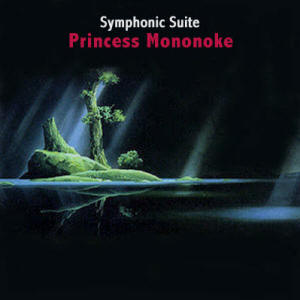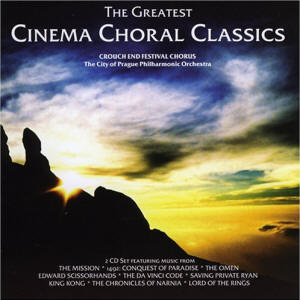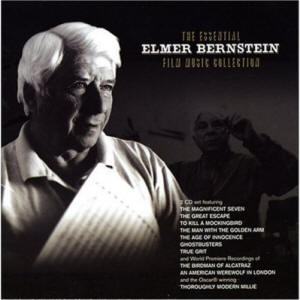|
You are reading the older HTML site Positive Feedback ISSUE may/june 2007
Film Music from Prague
Prague is not a city that one usually thinks of when one thinks of film music. While the Czech Philharmonic has been know for the last century as one of Europe's finest orchestras, with associations with such famous conductors as Antonin Dvorak, Gustav Mahler, and Richard Strauss, film music as not been synonymous with Prague. That started to change in the early 1990s as the orchestras of Eastern Europe struggled to find ways to earn money to replace the subsidies that were no longer coming from the Communist State. The classically trained musicians of Prague discovered that recording music for films offered one such money earning opportunity. Rerecording film music for reissue turned out to be another money earning opportunity. Since the orchestra used to record a film score is usually smaller than a full classical orchestra, the City of Prague Philharmonic Orchestra was formed in 1994. This 40 member chamber orchestra, whose members are drawn from the Czech Philharmonic Orchestra and other local ensembles, specializes in 20th century classical music and the recording of film scores, both for the original soundtrack and for rerecording and reissue. The three CDs reviewed here are a sample of the type of film music being recorded in Prague.
Princess Mononoke Symphonic Suite - If you are familiar with Japanese anime you have seen Princess Mononoke. It is a full length feature cartoon from Studio Ghibli, which is Japan's version of Disney Studios. While Studio Ghibli, like Disney, usually produces children's cartoons, Princess Mononoke was more for adults than children. The film dealt with the question of whether man and his technology could coexist with Nature. With a compelling story and incredibly gorgeous drawing, the movie broke all box office records in Japan when it was released. Like most great Japanese films, it did less well overseas. The film score for Princess Mononoke was written by Joe Hisaishi, a very popular Japanese pianist and composer with over 100 soundtracks and albums to his credit. Mr. Hisaishi took his film score and rewrote it as an eight movement symphonic suite. The CD liner notes quote Mr. Hisaishi as saying "The reason why I asked the Czech Philharmonic Orchestra to perform was simple. I wished to hear the piece ‘The Legend of Ashitaka' (the first movement) played by a first-rate professional orchestra that would perform the piece with a deeply Slavic feeling." Japanese music with a deeply Slavic feeling—that is a good description of the music. The music is dark in feeling and mood. Quiet and peaceful one moment and driving, thrusting forward the next. The music is classic romanticism with hints here and there of early Stravinsky (Le Sacre du Printemps). But what it reminds me most of, is Dvorak. Dvorak had a incredible way with bringing the folk tunes of his native land to life. Imagine if Dvorak had grown up outside Tokyo instead of outside Prague. I think this is the type of music he would have written. Both the original soundtrack and symphonic suite, which is being reviewed here, are currently available on CD. If you think you might be interested in this music I would go to www.amazon.com and listen to the tracks from both the soundtrack and the symphonic suite. While I enjoy both, the classical music lover in me finds the symphonic suite to be the preferred version. The soundtrack CD consists of 32 short tracks ,which if listened to in order, sort of tells the story from the film. The symphonic suite, however, is an organic whole which stands on its own. Think symphonic poem. If you are a classical music lover, do yourself a favor and give the symphonic suite a listen. Oh, by the way, the music is well recorded and mastered. So, you can play it for your audiophile friends. However, buy it for the music.
The Greatest Cinema Choral Classics Vol 1 and 2 - Normally I avoid "The Greatest Hits" type of recordings, particularly for soundtracks. When I watch a movie I want to see the whole movie, not just highlights. I feel the same way about the soundtrack. I want to hear the entire film score since each separate cue is part of a whole and really can't be separated from the other cues without losing something. It was with great trepidation that I bought this 2 CD set. However, I have learned that if you keep buying albums, you eventually find a few needles in the haystack. This album is one of those rare finds. Audiophile sound quality. First-rate orchestral playing. Superb choral and soloist singing. Stunning performances. There are 26 tracks on these two CDs. There is not a single bad track amongst the 26 tracks. The selection of music is brilliant. The only track that most people will recognize will be the first track, O Fortuna from Carl Orff's Carmina Burana.(1) O Fortuna, which was used in the movie Excalibur to great effect, is such a crowd pleaser, the producers really could not have left it off of the CD. Besides the Orff, there is one other classical track included amongst the 26 tracks—Samuel Barber's Agnus Dei which was used in The Scarlet Letter. Agnus Dei is Barber's Adagio for Strings sung with words by a male chorus and a boy's choir. This is very beautiful and emotional choral music. The remaining tracks are as follows:
John Williams, Revenge of the
Sith, Battle of the Heroes This is quite an eclectic group of choral works covering both major and minor film composers. For the more obscure works such as the Concerto in e for Soprano, Chorus and Orchestra from the Double Life of Veronique, this CD may be your only way to hear this music. The movie soundtrack CD is still available, but what are the odds of your buying a Zbigniew Preisner film score? Please note that this Concerto is really music written for the film. It just sounds like a classical concerto. For some of the major composers, this album may be the only way in which you can hear the music with decent sound. Conan the Barbarian is probably Basil Poledouris' best film score. Of all the Conan CDs that I have heard, none have sounded good. All were veiled and muddy. I also have the original LP. The LP sound quality is better than the best of the CDs but it still leaves a lot to be desired. With this rerecording. I finally, for the first time, heard the lyrics for Riders of Doom(2) instead of just a mishmash of vocal sounds. The Lion in Winter Suite is a similar situation. All of the CDs that I have heard of The Lion in Winter are veiled. None of the CDs sound as good as the original LP. The Lion in Winter Suite on this CD, which is made up of three of the original tracks, sounds slightly better than the original LP. I wish they had rerecorded the entire soundtrack. If you like classical music, choral music, well recorded music, and/or film music - buy this album. You won't regret it.
The Essential Elmer Bernstein Film Music Collection - As stated above, I really do not like to listen to "Greatest Hits" albums of film music. However, having enjoyed the Cinema Choral Classics reviewed above, I decided to take a chance on another of the City of Prague Philharmonic Orchestra's film re-recordings—a 2 CD set of Elmer Bernstein's film music. Elmer Bernstein's last recording projects had been with the City of Prague Philharmonic. So the orchestra was familiar with his style. Also, the two CDs included, arguably, most of Bernstein's greatest film music as well as fifteen minutes of never before recorded music. This 2 CD set, while not being as great a musical gem as the Cinema Choral Classic CDs, is very nice. The music is again very well recorded, though it is recorded with three different orchestras in several different locations at different times. So the acoustics are not uniform from track to track. Still I don't think many people will have a problem with the sound quality. The performances are inspired. The playing top-notch. The music includes:
The Magnificent Seven Of the 26 tracks on these two CDs I found only two tracks to be less than captivating. The performance on the Magnificent Seven track was not my cup of tea. For better performances refer to my review in PFO 26 https://positive-feedback.com/Issue26/toc26.htm . The other track that I found lacking was the previously unrecorded Sky-Hi from Thoroughly Modern Millie. Thoroughly Modern Millie was the only film score for which Bernstein won an Oscar. This is a crime out done only by Ennio Morricone never winning a single Oscar for his film music. Thus, something from Thoroughly Modern Millie had to be on this "Essential Bernstein Film Music Collection". I would have chosen something other than this light bit of fluff. The tracks that I really enjoyed included the two jazz scores: Walk on the Wild Side and The Man with the Golden Arm. Both tracks were performed by the National Youth Jazz Orchestra who do a superb job in conveying the jazz elements of the score. The Suite from To Kill a Mockingbird is 8:22 minutes in length. I wish it were longer. Poignant, lyric, melodic—music doesn't get much better than this. If you have seen and enjoyed the movie Airplane I defy you to listen to the Suite from Airplane without cracking a BIG smile. Starting with the opening theme from Jaws (remember the airplane tailfin moving back and forth above the fogbank) you will be reminded of one crazy scene after another. The premiere recording of Metamorphosis from An American Werewolf is, to me, worth the price of the entire 2 CD set. This is five minutes of the most chilling music that you have heard in a long time. The River Crossing from Zulu Dawn is stirring martial music which will get your blood flowing. Taarna's Theme from Heavy Metal is also martial, but quite different. The melody line was written for the ondes martenot, one of the earliest electronic instruments with a sweet, almost angelic female voice. In this performance Taarna's theme starts strong and martial and ends soft, tranquil and ethereal. If you don't have any Elmer Bernstein film music and don't want to buy the entire soundtracks, this 2 CD set is an excellent place to start. If you already have all the main Bernstein soundtracks in your collection you may still want to get this album for the premiere recordings of the Airplane Suite and the Metamorphosis from American Werewolf. If you only want to buy one 2 CD set of film music I would buy the Choral music over the Bernstein. However, being the soundtrack addict that I am, I am very glad that I bought both. Princess Mononoke, Milan 73138-35944-2 The Greatest Cinema Choral Classics, Silva Classics SILKD6040 The Essential Elmer Bernstein Film Music Collection, Silva Screen Records SILCD 1178 (1) If you have ever read the text of Carmina Burana, you might have been puzzled by the meaning of some of the lyrics. Do a google search on "Udo of Aachen". Udo was a 13th century monk. He wrote some of the lyrics used in Carmina Burana. He was also a mathematician who wrote several texts on probability (gambling) theory—"O Fortune". He also did work with fractals. He manually calculated and plotted the Mandelbrot set—a feat that was not duplicated until 1978 when it was done using computers. (2) The lyrics to Riders of Doom are sung in Latin. The translation of the text as given in the CD liner notes is: "We seek savage swords. We, iron kings, servants of fate bring deadly weapons that spring from the Earth against the enemy in war. We control high-spirited horses shaking their proud heads. Spirits, if dead, give death and bitter grief to the enemy who must be laid low. Hail Nevis! Hail Iron! Hail Weapons! Hail Terror!" Not your everyday Latin text, but most fitting for the final battle scene of the movie.
|




